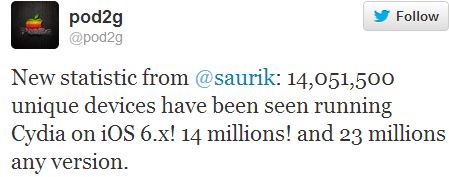On June 11th 2013, Apple will be celebrating the first birthday of its iOS 6 operating system. Is there a better time to take a look at the numbers? What, for example, is current state of affairs between Apple and the jailbreaking community?
According to Jay Freeman – a.k.a. @saurik, creator of Cydia, the main jailbreak applications store – the free developers are still one step ahead of the powerful American company despite Apple’s recent efforts to secure their system.
Indeed, according to him, more than 14 million users have downloaded Cydia for iOS 6, and as many as 23 million if we include older versions of the system. Note that this figure must have risen since then. Apple was hoping that the latest version of its operating system would stop the fraud, but in fact it took only a week after the launch for the first jailbreaks to come online, much to the delight of the 1.5 million users who downloaded it on the very first day it was available!
Of course this is small beer compared to the 500 million iOS devices sold by Apple last year. At Cupertino’s headquarters though, Apple executives are not underestimating the threat from Cydia and its partisans.
Why is jailbreaking so appealing?
The first goal of the developers of jailbreaking was to offer more choice than Apple did at the time. Obvious examples come to mind:
- customization applications (WinterBoard, Auxo, Dashboard X…)
- advanced settings for more control (SBSettings, Nitrous, MyWi…)
- new features like games and emulators
- allow access to content forbidden by Apple (pornography, nudity, political matters, some kinds of humor…)
It is probably the last feature, access to content, that explains why jailbreaking has become, over the years, a symbol of resistance against the tyranny of the new technology giants. A growing number of people believe big companies like Apple or Google have been given (or indeed simply assumed) too much power over their customers. The rights of users to privacy, freedom of control over what they are paying for and legitimate access to content come a poor second to commercial concerns and managerial whimsy. (See Forbidden Fruit, Apple’s dumbest application bans)
Indeed, as time has passed and successive iOS versions have come out, Apple has reinforced both its restrictions on applications approval and its protection against jailbreaking. This policy reached its peak with the removal of Google Maps and its replacement by Apple Maps, a move which was quickly subject to an avalanche of criticism and ridicule from around the world. Even today, the only way to get Google Maps by default is to jailbreak your phone.
How is Apple reacting to this situation?
As already stated Apple is reinforcing its operating system security, release after release but they also know it is ineffective as the hackers will always find a vulnerability to exploit : history has proved that no matter how strong the shield is, the sword will always find its way through it.
Knowing this, Apple is now using another strategy, cleverer and more customer-oriented strategy, from the ‘if you can’t beat them, join them book’. This consists in taking some good ideas from the Cydia catalog and adding them to their own operating system. The most obvious example of this method was spotted upon the release of iOS 5, which included natively a lot of features taken from “previously illegal” applications. The “notification center” for instance, has been almost entirely ported from a Cydia application. Apple even hired a the developer of MobileNotifier – an non-supported app – to lead its “new features” creation team!
Cydia victim of its success?
For the first time of its – rather young – history, Cydia has been the target of criticism from its own users. Indeed, when the latest “evasi0n” patch (the most renowned jailbreaking tool) for iOS 6 was uploaded, the demand for Cydia was so high that the servers could not answer to all requests, leading to delays and crashes on the main host for several hours.
While this may not seem very relevant, one might wonder if Cydia is not close to reaching the limits of what a free platform can offer. Even though they are earning a respectable amount of money from application fees ($10m a year aproximately), this is not enough to cope with the increasing number of users on their service everyday.
A better development model elsewhere?
Although it is a free application and designed in a different way from Apple’s, Cydia is still the property of one person, Jay Freeman, and this is one of its limits when it comes to finding an ideal development model for the future of mobile telephony. The open-source model seems to be – for the time being – the only viable solution to link « freedom of choice » and « millions of users ».
This is the choice Cyanogenmod developers have made for their firmware (based on Google’s stock version of Android), a choice that has been adopted by more than 5 million registered users. Cyanogenmod can be compared to Cydia in a lot of ways, but a major difference is the role of the Gyanogenmod community whose participation and support is remarkable. Last year, for example many users contributed money so that the developers could purchase extra servers. More information on their website.
And ‘community’ is also the watchword for XDA (or xda-developers). XDA are a group of people gathered together to discuss everything mobile, share ideas and developments on and around pratically every mobile operating system (except iOS). Their website registers more than 5 million members, which supports the idea that there is no need for a single, centralized OS distribution in order for improvements to be made- unless you are using an Apple device, of course!
Some useful sources for further reading:
http://www.businessinsider.com/jailbreak-statistics-2013-3
http://readwrite.com/2013/02/05/why-jailbreaking-ios-6-is-popular-enough-to-break-cydia
http://readwrite.com/2012/06/13/apples-love-hate-relationship-with-ios-jailbreaking
http://www.idownloadblog.com/2011/06/10/apple-owes-jailbreak-community-apology/

4 réponses à “(jail) break the ice!”
I believe Apple could easily prevent jail breaking; however as you already mentioned, the jailbreak is popular; yet way too small compared to their own ‘legal’ sales. But I think its also very smart to let jailbreakers. It compensates Apple’s downsides as well as making it more popular and accessible for everyone.
Well I think « jail breaking » manipulation won’t disappear on Apple iOS or on Android. I think that this is a way for developers (and consumers) to have knowledges on what their phones are capable of.
I’m myself a user of CyanogenMod on a Galaxy S 1 smartphone that I’ve been using for3 years and I truly doubt that I could have handled 3 years with the original software. Having CyanogenMod or a custom ROM on the whole, clearly allows for better « management » and maintenance.
I think that jailbreak shouldn’t be something illegal, because when we buy a phone we own it, and normally we can do whatever we want with it, what should be illegal is hosting and downloading cracked apps.
The iPhone is a good phone, but if we look closer, it is quite limited. For example, in the one of the most advanced phones on earth, we cannot even block a phone number! Or go to the top of a text conversation, or add ringtones without buying them, or and so on, it can take hours to complain. Thankfully, jailbreak exists.